Karen van Helden
- Hits: 713
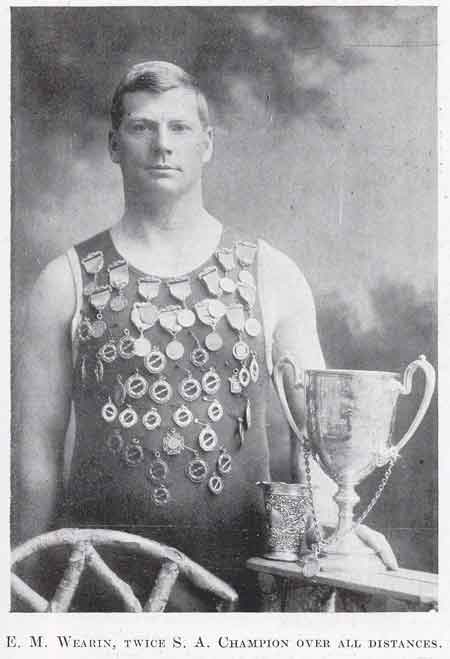
Ted Wearin
Edward "Ted" Melville Wearin was born September 25, 1876, in Australia. He lived from 1916-1935 at "Granville" on Romney Road, Greenpoint. Married Olive Gwladys Palgrave Potter (born Powys). In 1900, he travelled to the Cape Colony on the SS Kent, with 500 horses destined for the British soldiers fighting in the Boer War. (Another source states: The first to deliver the NSW Lancers from Sydney to South Africa, departing 28 October 1899 and arriving 6 Dec 1899. The transport consisting of 3 officers and 37 men of the Lancers, 6 officers and 80 men of the Medical Corps, 4 special service officers and 189 horses.)
Ted Wearin won a number of South African swimming championships, including both the 100 and 500 yards in 1902. In 1904 he won again won all of the races - 100, 220 and 500 yards, but did not return to defend his titles in 1905. In 1911 he re-appears, playing water polo for Transvaal. He came from Maryborough in Australia to fight in the Boer War, settled in the Cape (later in the Transvaal) and was a member of the Green and Sea Point Swimming Club. His story as a sailor is related by Lawrence Green in his book At Daybreak for the Isles seen below.
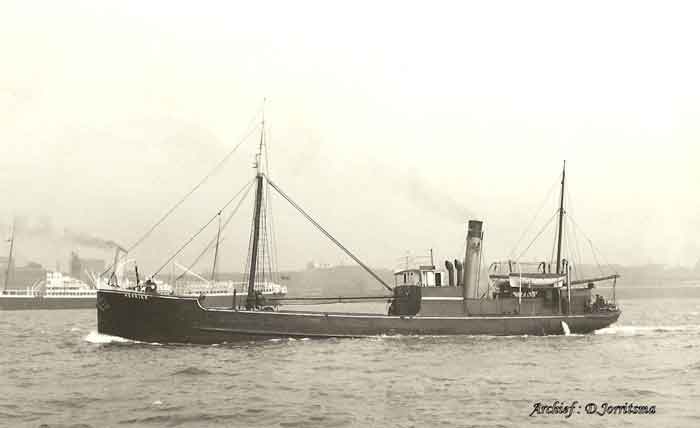
S.S. Harrier, which Ted Wearin sailed from Glasgow to Cape Town.
by Lawrence Green.
Finally the Cape Government decided to sell the Sea Bird and send a steamer sealing. There was an idea at that time that only a sailing vessel could landmen on a sealing-rock; the old hands swore that the seals would smell a steamer and make for the water. However, the Sea Bird was sold, and Skipper Edward Melville Wearin, owner of the S.S. Magnet, was offered the sealing contract.
A mighty man is Wearin, even in his old age. He and Mister Milo went sealing together for many years – a strong partnership. They worked Hollam's Bird successfully, and there they made the record catch of 2,400 seals in one day. There was a small fortune in it, and yet you should hear Skipper Wearin' s views of that islet."Of all the accursed places..."
Wearin is a man worth knowing, are incarnation of the fine seamen of last century. This huge Australian has massive shoulders and arms; he was a champion swimmer in his youth. As a boy he wanted to go to sea, but his father made him serve his time in an engineering works. He arrived at the Cape as a soldier during the South African War and stayed on in the Cape Town railway workshops after the war. The pay was good and he was able to have a twenty-two-foot yacht built for the weekends.
Wearin still hankered after the sea, and the little Advance helped to satisfy his longing. Then came a depression, and in 1905 Wearin was sacked. He took out a sealing-licence for Cape waters and turned his yacht into a sealer. After a few profitable seasons along the Cape coast Wearin heard of the rich sealing-grounds near Luderitz. So he sailed north, five hundred miles in his twenty-two-foot cutter, and thought nothing of it. He set nets for seals off Long Island, parallel nets in the seaweed, close to the reef. Lights attracted the seals at night, and those that jumped the first net were taken in the second. German poachers were raiding the British rocks, using dynamite, but they sheared off when they saw Wearin and the Advance. Once in a long while Wearin was able to land on Eighty-Four Rock, a treacherous place, but good for anything up to five hundred seals if the weather lasted. "I sent the large skins to Russia – they used them for sleigh-covers," recalled Wearin. "
Pup skins went to New York, and in a few years I was able to sell the Advance and buy a steamer. Poor old Advance! She dragged her anchor off Staple Rock and was lost with all hands. "Ay, it's a dangerous game, sealing. You're often close to the surf, and many a cutter has been caught between the rocks and the beach, caught broadside and turned over. Staple Rock has an iron bolt on the summit - you lash yourself to the bolt when the sea sweeps over. I was always lucky about accidents, though. I got two bites on the left arm and two on the left leg ... nothing more. They get excited and snap as they rush past you."
Wearin's tiny hooker, the fifty-ton Magnet, had been plying for years between Table Bay Docks and Robben Island. He ran her as an excursion steamer and did some fishing. Then the superintendent of the guano islands called him in and asked him whether he would go sealing for the government. "So I took the job on," said Wearin."
The government found the coal and stores, I provided the Magnet at £20 a month, and I was paid by results. Four shillings a skin I got for myself, and I signed on a sealing crew of twelve white men. Everyone said I was daft." On the October day in 1911 when Wearin steamed out for the islands, a group of old sealers gathered on the wharf at Table Bay Docks and jeered. "We'll eat all the skins you bring back," shouted the old sealers. "I hope you have a damned good feed," called back Wearin, and on that note the tiny Magnet slipped off to sea. That was the first time Wearin saw Hollam's Bird. He picked up Mister Milo and six coloured boatmen at Ichaboe and anchored off Hollam's Bird. "Of all the accursed places..."
Wearin pointed to it on the large scale-chart. "I worked it for twenty-five years - me and Milo," he told me."Since I retired in 1936 never a man has worked that island. The gear you need! Marks and anchors, buoy ropes, six-inch warps, barrels and chain. The bottom there is like polished granite, with nowhere for an anchor to hold."
Somehow the Magnet's anchors would grip at last, and then Wearin and Mila would climb the rocks and see how the seals were lying. One day they made a rough count - there were sixty thousand seals on the island. It usually supplied them with one-third of the season's catch. That first season Wearin cleared £1,000 in two months. He returned to Table Bay with five thousand pelts, a larger haul than any the Sea Bird had ever made. Wearin had six thousand skins on board the Magnet in August 1914,when war was declared. He knew nothing of it; but the Halifax Island headman, who was friendly with a German lighthouse-keeper, had received a warning. The headman passed it on to Wearin just in time. Wearin got his anchor up and steamed south at full speed; and as he departed a saw a German tug rounding Pedestal Point in pursuit of the Magnet. He got away with his six thousand skins.
When the South African forces invaded South-West Africa, the little Magnet was commandeered to reconnoitre the German-held coast. Wearin showed the troops the best landing-places and put intelligence officers on shore near Luderitz. One night he had to swim back to the Magnet - three-quarters of a mile, with a German patrol firing at him, trying to ignore bullets, the risk of sharks and the icy water. Only a man who held fifty gold and silver cups and medals for swimming could have done it. Wearin lost the Magnet in a Hout Bay gale in 1916.
Six years later he visited Britain and bought the ninety-ton Ranza, a Glasgow herring-carrier. He brought her to Table Bay with a crew of seven in six weeks, and went on with his sealing. South Africa's "one-man shipping line", as people called him, was established again. The Ranza served him well for five years; then he sold her and travelled to Britain again in search of another ship. This time he bought the coaster Harrier, his last ship and his largest -200 tons, and 120 feet in length. He and Milo made rich hauls at Hollam's Bird, and loaded her long fore-deck with skins. "
But I had to clear out for my damn life when the weather made," said Wearin. "You can't steam into the wind with a heavy deck-load like I often had - it meant running to save the skins." Wearin told me about a sealer who lost his nerve on Hollam's Bird when he saw the whole herd rushing towards him. This man lay flat in a rocky crevice, protecting his head. Scores of seals passed right over him, making for a cliff from which they dived fifty feet into the sea. The man got up unhurt. One of the tricks of the trade is to wear old; tattered clothes - garments that fall apart if a seal grips a coat-sleeve or trouser leg.
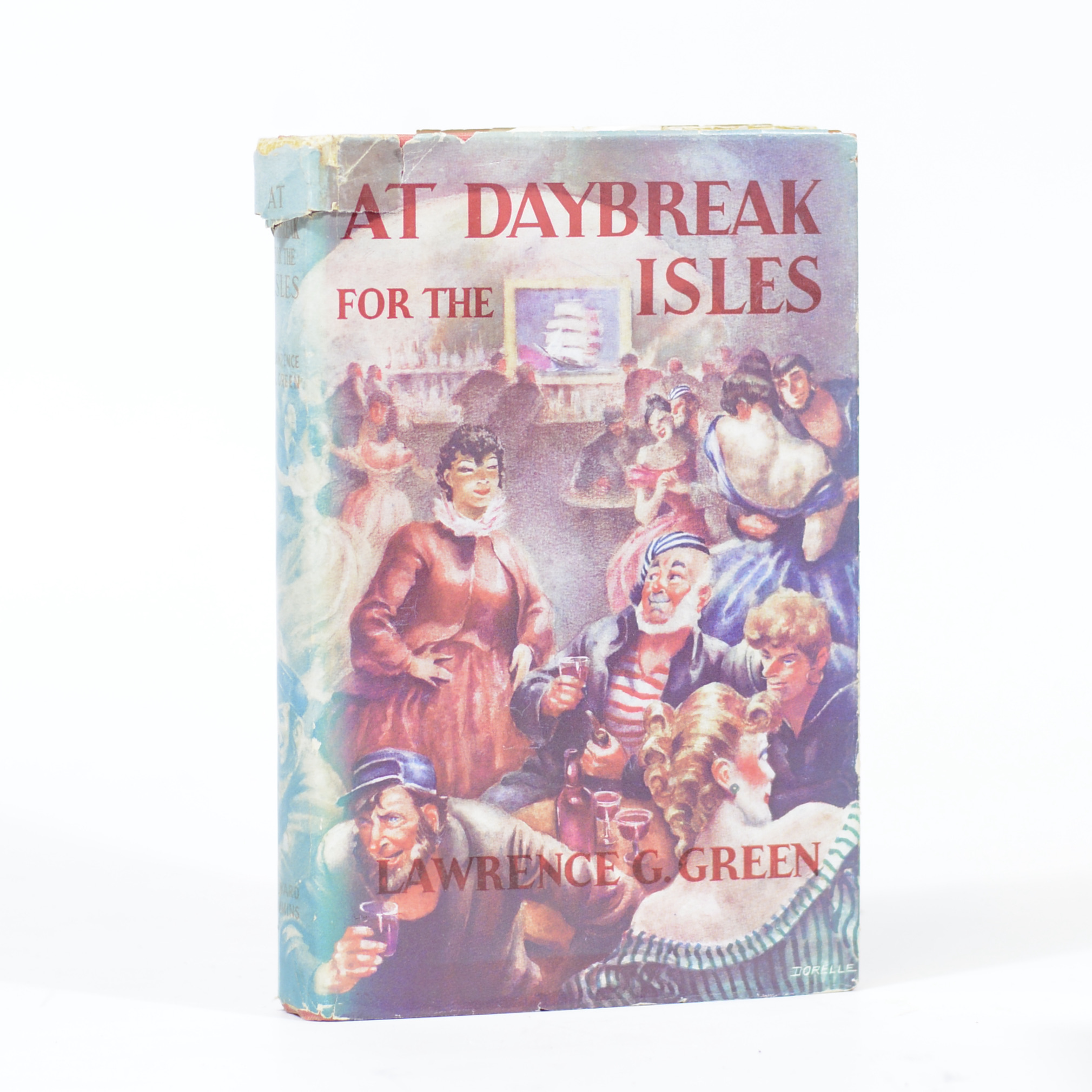
Covering a thousand miles of South African coastline and the offshore islands. Adventures to far places, a peek into the lives of people living on these remote islands, shipwrecks, treasure and looting. Strange characters, like Black Sophie, who kept a seaman’s boarding house in Cape Town and gave her name to an island.
5 August, 1950

The accompanying picture is that of capt. ‘Ted’ Wearin, taken in his youth. He is adorned with 47 medals, and beside his is a magnificent cup, gold watch and chain, and silver filigree jardinière – all of the spoils of sport. Most of the medals are of gold.
A notable figure, Mr. Wearin is at present on a extended holiday from Cape Town, South Africa. He and his wife are the guests of his sisters, the misses Amy and Isabel Wearin, at their home in Granville just off the Granville bridge. A host of old friends remember Mr. Wearin for his prowess in the world of sport. He rowed with the champion four-oared crew of Queensland in Maryborough in 1896 when it was ‘stroked’ by Mr. Billy Gordon, still of this city. Again, in 1899, he was with the champion four-oared crew of Queensland in Rockinghampton, stroked by Newt. Barton, a man with a notable sporting career and since dead.
The next year, 1900, saw Mr. Wearin onboard the S.S> Kent with 500 horses for use as army remounts for the Boer War in South Africa. There he joined the 1st Brabant’s Horse at Port Elizabeth, and did two years service. Discharged in Cape Town, Mr. Wearin joined the South African workshops and for five years worked as a moulder. Sea called Although the job was well paid the call of the sea was too strong and he became the owner of a half-decker 22ft. boat., in which he went seal fishing.
The job proved remunerative, but ceased owning to the Government refusing to issue private licenses. The next three years saw Mr. Wearin at his trade in Johannesburg, where he earned big money. It is a wonderful place for a mechanic, he says. After this he bought a 50-ton steamer, the Magnet. With this he ran excursions around the bay, and carried cargo in the off-season. He then worked for the Government, taking stores and labour to the Guano Islands, and also doing seal fishing. His ship was lost three year4s later.
Nothing daunted, Mr. Wearin went to Glasgow and bought a 100-tonsteamer, the Ranza, and sailed her to Cape Town. After ten years he sold her. Mr. Wearin holds his Masters Certificate, which he gained in 1921. It was during the coal strike of 1916 that another trip to Glasgow that resulted in the purchase of a 300-ton steamer. She got as far as Bay of Biscay, struck bad weather, and to turn back and run before the storm. They put into Guernsey and then ran back to London and sold all stores, coal and ship and returned to Cape Town.
The S.S. Harrier After the coal strike, he again visited Glasgow and bought another 300-tonner, S.S. Harrier and this time took his purchase safely to Cape Town. He continued to work for the Government for a further 10- years and 1938 sold out. Altogether Mr. Wearin served the South African Government for a matter of 30 years. His duties took him from Bird Island, Port Elizabeth to Cape Town and the West Coast. During World War I, he did some work for the navy and was at the landing of troops at Luderitz and Walker’s Bay in South West Africa.
During the years Mr. Wearin proved his prowess in the water, winning over 50 swimming races. For five years he held the Championship form the 80, 100, 500 and 880 yards. In water polo, he represented Cape Town for five years in the Currie Cup tournaments and for two years he represented Johannesburg. Maryborough identities who remember Mr. Wearin’s swimming from the Tinana Bridge to the Granville bridge and who knew he would rather swim home from the boat shed than walk, will not be surprised to read of his activities in South Africa.
Featured in novels Carol Birkby, author of that fine book “Thirstland treks” has in it a full page photograph of Capt. Wearin, Master of the Table Bay coaster “Harrier”. In his tales of scaling ledges he writes: ”A seal can easily kill a man in the water – and the hunter’s boats are upset at times. Yet I knew one man, skipper Wearin, of the coaster “Harrier”, who plunged into the sea with a knife one day to dispatch a seal that was floundering in a net in which he had taken a shoal of fish.”
Lawrence Green in his book “So few are free” writes – “Then there was the famous little Harrier owned by her master Captain Ted Wearin. A genuine lover of the sea, Wearin was first a yachtsman. He decided to make the sea his profession, gained at certificate and entered the coastal trade. For years he hunted seals, carried labourers and stores to the Guano Isles, and became known in every port along the West Coast.”
Mrs. Wearin, born of British parents in South Africa is a direct descendent of the old famous 1820 Settlers who landed in Port Elizabeth and founded the colony. Their descendants are amongst the prominent South African peoples. Trip Home Deciding, with his wife, to pay the homefolk and old town a visit, Mr. and Mrs. Wearin left Cape Town on May 10 and had fine trip to Freemantle. There, he said, the trouble began, and because of strikes the boat was held up for fourteen days.
In Melbourne they were delayed ten days, partly because of rain. Arriving in Sydney they found the rail services to Brisbane dislocated, and after a wait of ten days they secured a passage on the P. and O. liner Maloja, to Brisbane. So far Mr. Wearin has not been very complimentary to us, for he is planning already to get back to Cape Town and says he will be delighted to see dear old Table Mountain again.
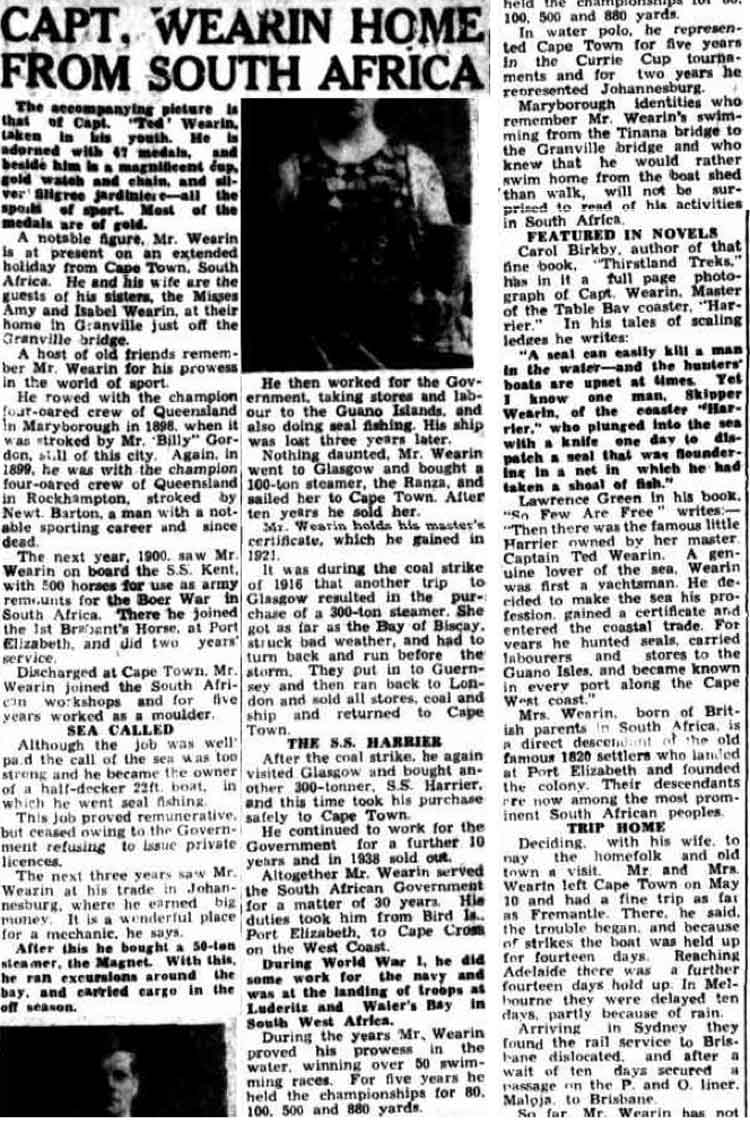
5th August 1950
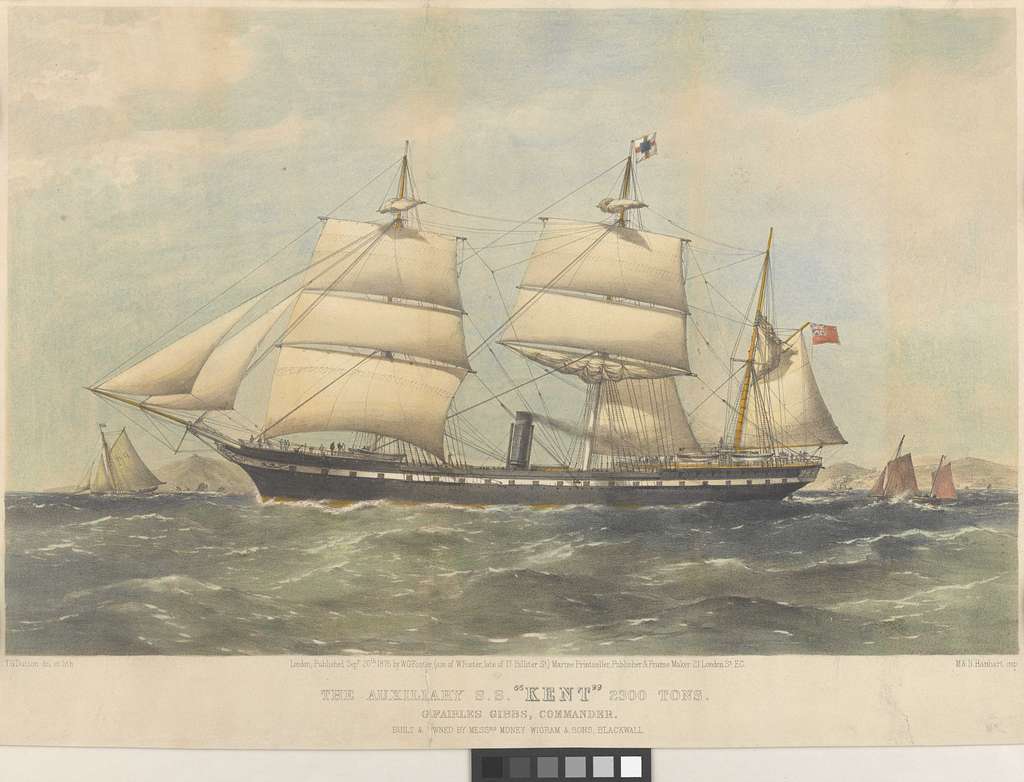
SS Kent